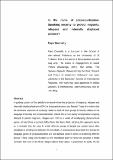In the name of (de)securitization : speaking security to protect migrants, refugees and internally displaced persons?
Abstract
A guiding concern of this article is to examine how the protection of migrants, refugees and internally displaced persons (IDPs) is being spoken about and framed. Today it is evident that the dominant responses of sovereign States to each of these groups issues is heavily reliant on the language of security and (de)securitization. Indeed, this article openly conceptualizes ongoing attempts to protect migrants, refugees and IDPs as a series of overlapping (de)securitized games. At least three arguments follow from this claim. First, adopting this approach serves as a reminder that the ways in which we speak about different groups of people are spoken about often constitutes a dividing line between life and death. A second point illustrated here is that the language games of (de)securitization are not identical vary when it comes to protecting different groups. Third, using securitization as the theoretical point of departure provides a timely reminder that none of the three categorizations listed above is guaranteed to apply. On the contrary, the adoption of each linguistic label – migrant, refugee, IDP – is subject to and dependent upon audience acceptance. Remembering the latter dimension is imperative to fully comprehend the ongoing contestations and countermoves currently underway to respond to people moving in search of security. By way of conclusion, this article contends that far more attention must be paid to broader understandings of acceptance and love to ensure the protection of migrants, refugees and IDPs.
Citation
Donnelly , F 2018 , ' In the name of (de)securitization : speaking security to protect migrants, refugees and internally displaced persons? ' International Review of the Red Cross , vol. 99 , no. 904 , pp. 241-261 . https://doi.org/10.1017/S1816383117000650
Publication
International Review of the Red Cross
ISSN
1816-3831Type
Journal article
Rights
© icrc 2018. This work has been made available online in accordance with the publisher’s policies. This is the author created, accepted version manuscript following peer review and may differ slightly from the final published version. The final published version of this work is available at: https://doi.org/10.1017/S1816383117000650
Items in the St Andrews Research Repository are protected by copyright, with all rights reserved, unless otherwise indicated.

